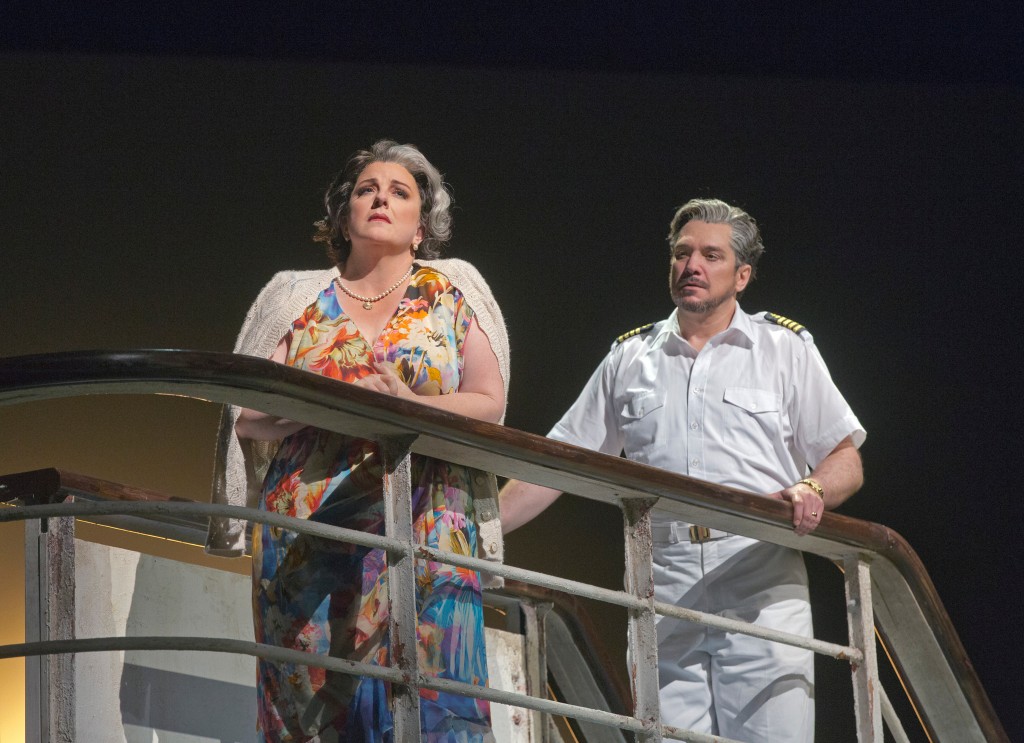Operas rarely make headline news, but the Metropolitan Opera’s debut of John Adams’ rich and complex 1991 work, The Death of Klinghoffer, has become an international sensation, not so much for what happens onstage, but for the controversy it has ignited.
Inspired by the real-life terrorist incident in which an American-Jewish tourist was murdered abroad a hijacked Italian pleasure cruise ship, the opera has been assailed by some factions as anti-Semitic, as well as sympathetic and even propagandistic in favor of the Palestinian cause. Hundreds of protestors gathered outside the Met on opening night and a few bought tickets and attempted to disrupt the show with catcalls. At the performance attended (the third), there were a handful of demonstrators carrying signs calling for the cancellation of the “racist” opera. While several of the characters do express anti-Jewish vitriol, the work itself is not anti-Semitic and attempts to explore the complex, never-ending Middle East crisis through compassion and poetry.
It doesn’t entirely succeed.
Alice Goodman’s dense libretto often veers into obscure territory invoking agricultural and mystical imagery—at one point the passengers sing of a “lion-ant,” whatever that is—rather than focusing on the devastating issues at hand. But Adams’ rich and intense score brings us back to the terrible conflict and gives color and depth to the figures caught up in it. Tom Morris’ thoughtful production combines the demands of opera and drama by giving constant movement to arias, group and choral sequences while Arthur Pita’s inventive and kinetic choreography delineates the raging emotions at work.

Credit: Ken Howard/Metropolitan Opera
Most of the action is told in flashback. After a prologue with separate choruses of exiled Jews and Palestinians, survivors including the captain and first officer recall the horrifying takeover in what appears to be a panel discussion. Tony winner Paulo Szot (South Pacific) magnificently expresses the moral confusion and guilt of the captain who feels he could have done more to prevent the murder of Klinghoffer, but feared endangering the rest of the lives in his care.
This seminar sequence leads into scenes aboard the ship, alternating with mostly mystifying chorus numbers. Perhaps the most controversial moments involve those in which the four terrorists are presented as human beings—terrible, twisted villains, yes, but also real people with motivations behind their heinous actions. For example, Mamoud (the scary and moving Aubrey Allicock) sings of his favorite popular songs as he fiddles with a radio while guarding the captain. In the same bittersweet melancholy tones, he recalls seeing his brother’s decapitated body and explains there can be no peace in the region. Jesse Kovarsky as the youngest hijacker, the one who pulls the trigger on the wheelchair-bound title character, expresses his violent urges through dance in an electrifying performance.
Klinghoffer works best when capturing the small moments of the tragedy such as a grandmother calming her grandson, an Austrian woman’s taking stock of her food while trapped in her cabin or Marilyn Klinghoffer innocently chatting about medical problems as her husband is being killed on deck. Maria Zifchak, Theodora Hanslowe, and Michaela Martens illuminate the heartbreaking significance of the seemingly trivial details in these arias. Martens later delivers a devastating finale when Mrs. Klinghoffer learns of her spouse’s fate and confronts the shattered captain.
The contrasting arias of the title character, beautifully performed by Alan Opie, exemplify the strengths and weakness of the work. In his first solo, the handicapped Klinghoffer bravely snaps back at the terrorists after a vicious vocal assault by the most venomous of the quartet (Ryan Speedo Green in an appropriately brutal turn). It’s heroic, specific, and powerful. Then after he is shot, Klinghoffer stands and sings the “Aria of the Falling Body.” Opie performs it with great artistry, but Goodman’s words are so vague and symbolic, we are left unmoved. That’s The Death of Klinghoffer in summary—stunning one moment, cold and remote the next.
Oct. 20—Nov. 15. Metropolitan Opera House, LincolnCenter, 165 W. 65th St., NYC. Schedule varies. $25-$220. Running time: two hours and 50 mins. including intermission. (212) 362-6000 or www.metopera.org.
This review has appeared on ArtsinNY.com and Theaterlife.com.
